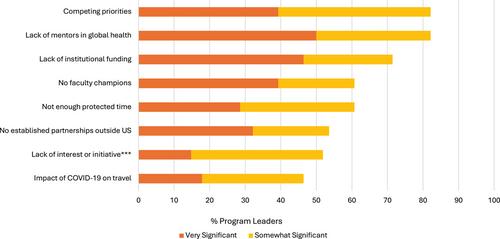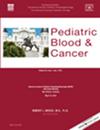Global health training opportunities during pediatric hematology/oncology fellowship: Results from a survey of program leaders
Abstract
Background
There is growing interest in global health (GH) among medical trainees in the United States. However, providing GH training opportunities at the fellowship level presents several challenges. Understanding of barriers and facilitators to implementing GH training is essential for addressing these challenges.
Methods
We developed a comprehensive survey of 65 Likert-scale multiple-choice and open-ended questions to assess perspectives of pediatric hematology/oncology fellowships leaders on GH training. The survey was electronically distributed to program leaders at all ACGME-accredited pediatric hematology/oncology fellowships programs, and data were summarized using descriptive analysis.
Results
Of 73 eligible programs, we had a 45.2% response rate with 27 complete and 6 partial responses. Respondents represented programs across the United States, including 19 (57.6%) affiliated with NCI-Designated Cancer Centers. Fourteen programs (43.8%) currently offer GH training opportunities, whereas 18 programs expressed interest in future opportunities (15, 83.3%) or plan to offer them soon (3, 16.7%). Major barriers identified include competing training priorities (23, 82.1%), lack of faculty mentors in the division (23, 82.1%), and lack of dedicated institutional funding (20, 71.4%). Key facilitators include the interest and initiative of current fellows (27, 96.4%), dedicated institutional funding (26, 92.8%), and having established international partnerships (26, 92.8%).
Conclusions
The study reveals strong interest in GH training in pediatric hematology/oncology fellowships. Despite challenges such as competing priorities and a lack of mentors, significant facilitators include current fellows’ initiatives, dedicated funding, and established international partnerships. These insights can help shape future initiatives to incorporate GH into pediatric oncology/hematology fellowship training.


 求助内容:
求助内容: 应助结果提醒方式:
应助结果提醒方式:


